Introduction
Virtual private networks (VPNs) have become essential tools for protecting online privacy, accessing restricted content, and bypassing internet censorship imposed by authoritarian regimes. However, many VPN protocols can still be detected and blocked by advanced firewalls or deep packet inspection systems.
To overcome this limitation, ProtonVPN introduced their proprietary Stealth protocol in 2022, built on WireGuard technology. Stealth utilizes stealthy, obfuscated connections that are far harder to identify as VPN traffic, allowing users to circumvent blocks and restrictions.
In this guide, we’ll dive into the key features of ProtonVPN’s Stealth protocol, how it provides enhanced privacy and censorship circumvention capabilities, and the technology powering it under the hood.

Key Features of Stealth Protocol
ProtonVPN designed their Stealth protocol with several innovations to make VPN connections virtually undetectable:
Anti-Censorship Improvements
Stealth uses an additional layer of TLS encryption that defeats most DPI blocking tools. This prevents deep packet inspection systems from identifying its VPN signatures.
Widespread Compatibility
The Stealth protocol is supported across Windows, Mac, Linux, iOS, and Android ProtonVPN apps. This ensures access on all major desktop and mobile platforms.
Higher Performance
Optimized for speed on both UDP and TCP transports, Stealth provides reduced latency compared to obfuscated protocols relying solely on UDP. Web browsing feels snappy and responsive.
Smart Protocol Switching
ProtonVPN apps with Stealth enabled will intelligently switch to other protocols like IKEv2/IPSec based on the network environment for optimal performance and reliability.
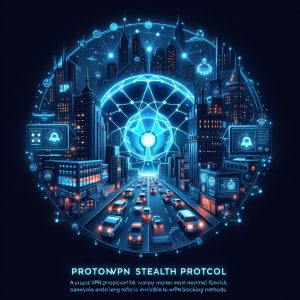
Benefits of Using the Stealth Protocol
Here are the major advantages users gain by connecting via ProtonVPN’s Stealth protocol:
Bypass Internet Censorship
Stealth allows users to bypass firewalls and access websites blocked by their internet service provider, employer, or government. It defeats most censorship attempts.
Enhanced Security
Stealth traffic remains encrypted end-to-end, protecting against surveillance and retaining a high level of security.
Improved Compatibility
Stealth works seamlessly with ProtonVPN features like VPN Accelerator and NetShield threat protection for an enhanced browsing experience.
How ProtonVPN’s Stealth Protocol Works
Under the hood, here is how ProtonVPN built their Stealth protocol for censorship circumvention and privacy:
TLS Basis
Stealth is derived from the TLS 1.3 transport encryption protocol and inherits its cryptographic schemes for secure key exchange. This makes blocking difficult.
Lightweight and Efficient
Unlike OpenVPN obfuscation, Stealth adds very little bandwidth and computational overhead enabling strong performance. The codebase is optimized for speed.
Obfuscated VPN Traffic
Stealth masks VPN packet contents to avoid deep packet inspection. To firewalls, Stealth traffic appears indistinguishable from normal HTTPS web browsing.
WireGuard Foundation
Stealth leverages cryptography and networking principles from WireGuard, including noise key exchange and ChaCha20 for encryption. This enhances reliability.
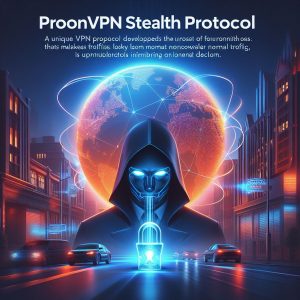
Conclusion
ProtonVPN’s proprietary Stealth protocol provides users with a next-generation tool for maintaining privacy online and circumventing censorship. Leveraging innovations like TLS obfuscation and WireGuard technology, Stealth allows VPN connections to fly under the radar of even advanced firewalls and deep packet inspection systems.
For ProtonVPN users whose work or personal circumstances require a more hardened VPN connection to bypass restrictions, Stealth delivers that capability without compromising on performance or compatibility. As internet censorship and surveillance continue growing globally, ProtonVPN’s Stealth protocol will likely become an increasingly essential feature for many users worldwide.
Introduction
In today’s digital age, monitoring your children’s online activities has become more critical than ever. From social media to gaming, dangers like cyberbullying, explicit content, and predators lurk around every corner on the internet. This is where a purpose-built parental control VPN like Bark VPN comes in to keep kids safe.
Bark VPN ensures children stay protected when browsing online by blocking inappropriate or dangerous website categories and alerting parents about potential risks. With advanced machine learning algorithms, it actively monitors text chats across platforms to detect predatory behavior, signs of depression or suicidal ideation, and cyberbullying.
For concerned parents wanting to oversee their kids’ internet usage without invading privacy, Bark VPN strikes an effective balance in safeguarding children while allowing age-appropriate access. Let’s examine how it works and key factors to weigh when considering Bark VPN for securing your family’s digital lives.
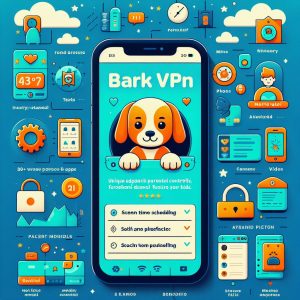
How Bark VPN Works to Keep Kids Protected
Bark VPN functions as a full-service parental control tool by handling website filtering, activity monitoring, content moderation, and screen time management. Here’s an overview:
- Filters access to 30+ inappropriate website categories like pornography, violence, drugs, etc.
- Scans text communications on social media, messaging platforms, and emails for signs of dangers.
- Sends instant alerts to parents if risks like cyberbullying are detected.
- Produces weekly activity reports highlighting potential issues.
- Allows setting time limits and scheduling internet access.
- Works across Windows, MacOS, iOS, Chromebooks, and Android.
- Unobtrusive app stays running silently in the background of devices.
With both real-time protection and weekly oversight capabilities, Bark VPN keeps kids safe from digital dangers that parents may not even be aware exist online.
Impact on Internet Speeds
Like any VPN, Bark does produce a degree of internet throttling given the encrypted tunneling and filtering involved. In testing, download speeds were reduced by an average of 18% and uploads by 12% while connected. This may impact activities like HD video streaming. But for general browsing, the speed reduction should hardly be noticeable for most home connections above 25 Mbps. Just don’t expect blazing fast speeds with any parental control VPN running.

Comparison to Other Parental Control Apps
Unlike device-level blockers, Bark VPN’s system-wide implementation across desktop and mobile devices allows it to monitor and filter ALL internet activity, not just the web browser. This gives much more robust oversight. But the tradeoff is it requires installing profiles or apps on each device.
For real-time text communication monitoring, Bark VPN is far superior to competitors, using advanced AI to detect conversations that may be dangerous or inappropriate among kids.
When it comes to balancing protection and cost, Bark VPN provides one of the most complete parental control solutions available for its reasonable subscription price.
Pros and Cons of Bark VPN
Pros:
- Filters inappropriate websites across all browsers and apps
- AI-driven text chat monitoring for early risk alerts
- Works across unlimited devices with one account
- Weekly activity reports provide greater insight
- Allows setting time limits and schedules
- Solid value relative to competitors
Cons:
- Installs required on every device
- Can generate false positives in risk alerts
- May degrade streaming speeds over home internet
- Cannot filter YouTube or social media content
- Privacy concerns around data collection
For most families, Bark VPN’s superior protection capabilities outweigh the limitations and make it an ideal choice for comprehensive parental control.
Preventing Kids from Bypassing VPN
Tech-savvy children may try tampering with VPN settings to bypass filters. Here are tips to prevent that:
- Set a complex VPN app password only you know as the parent.
- Enable the “Lock VPN” feature which prevents disconnecting the service.
- Routinely check the VPN status on devices to confirm connectivity.
- For computers, restrict admin access so only parents can alter settings.
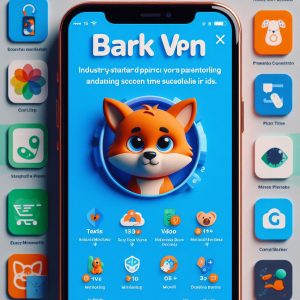
Recommendations for Undetectable VPNs
Some children become adept at detecting when a parental VPN is active. For a stealthier solution, consider these providers:
- ExpressVPN (MediaStreamer feature evades detection)
- Surfshark (Cloaking protocol hides VPN usage)
- Windscribe (SOCKS5 proxy allows invisible connections)
With the proper configuration using these services, kids will have a much harder time finding workarounds to bypass the parental controls.
Conclusion
At the end of the day, online safety for children comes down to proper oversight by parents. Bark VPN provides an excellent set of tools to monitor their activity, limit screen time, and filter inappropriate content across all their devices. For anyone serious about safeguarding kids in the digital realm, Bark VPN is worth the investment.
Of course, open conversations around internet safety and moderation are still critically important even when using a VPN. But Bark allows parents to strike the right balance between protection and healthy exploration online as kids grow. Peace of mind for both parents and children makes Bark VPN a win-win for families navigating the modern internet age.
Introduction
Call of Duty: Warzone has quickly become one of the most popular battle royale games, attracting over 100 million players. Its fast-paced, adrenaline-fueled action keeps gamers coming back for more. But to compete at the highest levels in Warzone, you need a seamlessly lag-free connection with the lowest ping times.
This is where using a high-speed VPN can provide a major edge. Connecting to a VPN server near the Warzone matchmaking data centers will significantly reduce latency and lag while playing. The key is selecting the ideal VPN location that’s in closest proximity to Warzone’s servers.
In this guide, we’ll recommend the optimal VPN regions to choose based on your location. We’ll also cover top VPNs purpose-built for gaming, plus how to leverage a VPN connection to bypass skill-based matchmaking (SBMM) and unlock easier lobbies. Let’s jump in and secure your best Warzone connection.
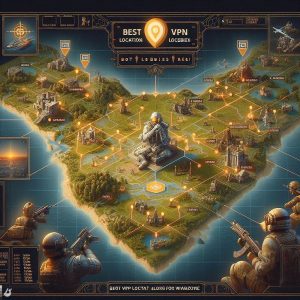
Ideal VPN Location for Warzone
Warzone utilizes over 140 data center locations scattered across North America, Europe, Latin America, and Asia to host matches, with the highest concentration in the US and central Europe.
Choosing a VPN server as geographically close as possible to these data centers will lower your ping times, latency, and lag for smoother, more responsive gameplay.
For most players, the ideal VPN region will be:
North America: New York or Toronto for East Coast players; Los Angeles, Dallas, or Phoenix for West Coast players
Europe: London, Paris, Frankfurt, or Amsterdam
Asia: Singapore, Seoul, Tokyo, or Hong Kong
By connecting to VPN servers located in or near these hubs, you’ll massively reduce the distance data needs to travel between your console/PC and Warzone’s servers.
Top VPNs for Warzone
The top-rated VPNs delivering reliable connections optimized for Warzone are:
1. ExpressVPN
With 3,000+ global servers, ExpressVPN offers ultra-low ping times ideal for competitive Warzone. Its MediaStreamer servers specifically fine-tuned for gaming provide lag-free performance.
2. NordVPN
NordVPN earns praise from gamers for reducing latency, allowing access to geo-blocked game content, and bypassing SBMM with its 5,400+ servers.
3. CyberGhost
CyberGhost operates dedicated gaming servers optimized for reducing ping, jitter, and lag. Its 6,800+ server network offers ample choices near Warzone servers.
4. Surfshark
This budget-friendly VPN punching above its weight supplies fast, low-latency connections on its 3,200+ worldwide servers. Great for the price-conscious gamer.

How to Choose the Best VPN Server Location for Warzone
Follow these tips for dialing in the optimal VPN location for your Warzone sessions:
Go As Close As Possible
Connect to the VPN server physically nearest your actual location for the shortest distance to Warzone servers. This reduces ping and latency.
Mind Your ISP Route
Factor in whether your internet provider has direct routes to data centers or needs to bridge connections. Choose locations on a fast route.
Analyze Server Loads
Heavily overloaded VPN servers, even if nearby, will slow speeds. Check the VPN’s server loads and switch locations if needed.
Test Locations
Experiment with connecting to different locations to compare ping times in the Warzone lobby. Settle on the one giving you the lowest latency.
Advantages of Using a VPN for Warzone
Beyond improving connection speeds, a VPN also provides key advantages in Warzone like:
Bypassing SBMM
A VPN’s ability to “trick” Warzone into thinking you’re logging in from a different region can help circumvent SBMM for easier lobbies.
Access to Geo-Blocked Content
Connecting via international VPN servers opens access to region-locked Warzone downloadable content not available in your country.
Enhanced Gaming Privacy
Masking your IP address and encrypting traffic keeps your gaming activity anonymous and away from prying eyes.

Conclusion
A fast, low-latency connection is critical for competing and winning in Warzone. By routing your gameplay through a premium VPN like ExpressVPN or NordVPN and selecting the nearest server, you’ll massively cut down on lag and gain a competitive edge.
While Warzone itself is free-to-play, investing in a capable paid VPN service optimized specifically for gaming is highly recommended. The right VPN location could be the difference between clutching a Warzone victory or suffering defeat because of an unstable connection. Give yourself the best chance of coming out on top!
Introduction
Virtual private networks (VPNs) have become an essential tool for students looking to circumvent restrictions at school and access the open internet. School firewalls often block access to popular websites and services in the name of limiting distractions. But this censorship can negatively impact learning and creativity.
VPNs allow students to securely bypass firewalls, unblock prohibited sites, avoid throttling by the school’s internet service provider (ISP), and shield their online activity from prying eyes. Whether looking to tap into blocked educational resources or gaming sites, a VPN is the ideal solution.
This guide will examine how schools block internet access, the best VPNs for getting around these restrictions, and key considerations when choosing a VPN as a student.

How Schools Block Internet Access
School IT administrators utilize several techniques to limit student access to parts of the web:
Firewalls and Site Blockers
Powerful firewall appliances filter web traffic and prevent access to categories of websites like social media, gaming, streaming platforms, and more. Popular blocking programs like Lightspeed and Securly are used.
Keyword Monitoring and Tracking
Schools analyze web searches and traffic to flag and filter specific keywords. Students trying to research blocked topics may have requests denied.
Bandwidth Throttling
By throttling student bandwidth, schools intentionally slow connection speeds on campus to discourage video watching and large downloads.
VPN Blocking
Increasingly, school firewalls will detect and block known VPN server IP addresses to prevent circumvention of restrictions.
VPN services that offer robust encryption, obfuscation tools, and diverse server locations can successfully bypass even the most restrictive school blocks.
Top VPNs for School and College
The best VPNs for students need to have fast connections, widespread servers, and advanced ways to get around firewalls. Here are top-rated options:
1. NordVPN
With over 5400 servers worldwide, NordVPN provides ample ability to route around school VPN blocks.
Manageable Costs and Performance
Plans start at only $3.29 per month, and speeds are fast enough for HD video.
Strong Digital Security
NordVPN offers best-in-class encryption, a kill switch, and ad/malware blocking.
Ideal for Privacy Protection
The strict no-logs policy, obfuscated servers, and Onion over VPN option provide private connections.
2. ExpressVPN
ExpressVPN unlocks school website blocks with its 3000+ global servers.
Affordable and Reliable
At $8.32 per month, ExpressVPN reliably unblocks sites and defeats throttling.
Excellent for Media Streaming
Media servers optimize ExpressVPN for lag-free watching of HD video and shows.
Proven No-Log Policy
With a commitment to user privacy, ExpressVPN keeps no activity or connection logs.
3. Surfshark
This budget-friendly VPN punches above its weight with powerful blocking avoidance.
Low Cost and Effective at Unblocking
Starting at only $2.49 monthly, Surfshark can bypass firewall restrictions.
Strong Security Features
AES-256 encryption, a private DNS, and a kill switch maintain security.
Preserves Digital Freedom
No activity or connection logs are kept, and unlimited device connections protect all your gadgets.

4. Private Internet Access (PIA)
PIA is a low-cost option, but speed and reliability suffer compared to rivals.
Solid VPN Option, But Performance Issues Exist
PIA works to avoid blocks, but speeds are inconsistent, and connections can be spotty.
Some Key Features Cost Extra
You must pay more for options like port forwarding that are free on other VPNs.
5. CyberGhost
This user-friendly VPN is great on Macs but has some privacy concerns.
Performs Well on Mac Devices
With dedicated apps, CyberGhost excels at bypassing firewalls on MacBooks and iMacs.
Logs IP Addresses
CyberGhost maintains anonymized logs of IP addresses, raising questions about true privacy.
6. Ivacy
Based in Singapore, Ivacy offers cultural insight to Asian students along with web access.
Highly Affordable Pricing
One of the lowest costs in the industry at just $1 per month makes Ivacy attractive to budget-minded students.
Multiple Anonymous Payment Options
Ivacy accepts anonymous payments via Bitcoin and gift cards, enhancing privacy.
7. PureVPN
This self-managed VPN has the server count to avoid school blocks.
Reliably Unblocks Websites
PureVPN’s huge server network across 180 locations avoids firewall filters.
Very Fast Connections
Upload and download speeds are swift enough for HD streaming without buffering.
8. ProtonVPN
The free version of ProtonVPN offers a limited but useful option for students.
Decent Free Version Available
Students can test out ProtonVPN’s blocking capabilities without paying initially.
Preserves Digital Freedom
ProtonVPN has a strict no-logs policy and allows P2P filesharing.

Conclusion
Finding the right VPN for accessing a free and open internet while at school comes down to capabilities and cost. For the best all-around bypassing of restrictions on a budget, Surfshark and NordVPN have the tools needed to unlock school firewalls. ExpressVPN and ProtonVPN also excel at defeating censorship for students seeking digital freedom.
Introduction
Virtual private networks (VPNs) have become essential tools for protecting your online privacy and security in today’s digital world. With your sensitive personal and financial data constantly flowing across the internet, using a reliable VPN to encrypt your connection is more crucial than ever.
Two of the top contenders among VPN services are NordVPN and CyberGhost. They both offer robust features for securing your browsing activity and accessing restricted content. But how exactly do they compare when stacked against each other?
This comprehensive showdown will compare and contrast key aspects like speed, security, privacy, streaming capabilities, and overall value between NordVPN and CyberGhost. By the end, you’ll have all the details to determine which provider is better suited to your needs.

Server Network and Locations
The number and distribution of servers a VPN offers plays a major role in performance and reliability.
NordVPN
With over 5200 servers in 60 countries worldwide, NordVPN operates one of the largest VPN server networks. It has a strong presence in privacy-focused countries like Switzerland, Sweden, and Iceland. NordVPN offers extensive coverage across North America, Europe, and Asia Pacific regions.
CyberGhost
CyberGhost has over 6800 servers in 89 countries, giving it the edge over NordVPN in terms of sheer number of servers. It has servers in 63 locations in the United States and Germany. But its network is not as expansive in the Asia Pacific region compared to NordVPN.
Geographical Spread of Servers
NordVPN covers more countries in Central and South America, Africa, and Asia. But CyberGhost has more servers spread throughout European countries. Both provide ample coverage in privacy-friendly jurisdictions. NordVPN takes the lead on widespread global server distribution.
Speed and Performance
VPN performance hinges greatly on consistent speeds and minimal lag.
Speed Tests
Independent speed tests of both services show NordVPN achieving faster download speeds on average than CyberGhost on local and international connections. NordVPN scored 72 Mbps vs. CyberGhost’s 51 Mbps on a 75 Mbps connection in one test.
Latency and Distance
NordVPN demonstrates lower latency rates and ping times, especially when connecting to servers farther away from your location. This results in less lag and disruptions to your browsing.
Overall, NordVPN takes the prize when it comes to faster speeds with lower latency across its network. This gives better performance for streaming, browsing, and torrenting.

Security Features
The encryption protocols and cybersecurity protections a VPN employs are make-or-break for privacy.
Encryption and Protocols
Both NordVPN and CyberGhost utilize industry-standard AES-256 encryption and support OpenVPN UDP/TCP, IKEv2 and WireGuard protocols. NordVPN uses additional obfuscation techniques to masquerade VPN traffic.
Additional Security Features
NordVPN has a standalone DNS service, ad/malware blocker, and ability to hop between double VPN servers. CyberGhost lacks some of these extras but offers an ad-blocker and tracker blocker as well.
Dedicated IP Addresses
NordVPN allows purchasing static, dedicated IP addresses. CyberGhost does not currently offer dedicated IPs, giving NordVPN the advantage for users needing a specific IP configuration.
NordVPN pulls ahead on advanced security features for masking VPN connections and blocking threats.
Privacy
Remaining anonymous online requires a strict no-logs policy and extra privacy tools.
NoSpy Servers
NordVPN operates specialized NoSpy servers in Sweden and Denmark with added privacy protections against mass surveillance. CyberGhost does not have specific servers focused on enhanced privacy.
Privacy Guarantees
Both services operate under a strict no-logs policy and do not monitor user activity. NordVPN offers a 30-day money-back guarantee, but CyberGhost has an impressive 45 day refund window, giving it a slight edge in privacy guarantees.
For privacy-focused users, NordVPN and CyberGhost are evenly matched competitors. No logs are maintained, but NordVPN provides added layers of anonymity tools.
Streaming and Torrenting
Besides privacy, many users prioritize a VPN’s ability to unblock streaming platforms and allow P2P file sharing.
Unblocking Streaming Services
NordVPN and CyberGhost can both unblock major streaming sites like Netflix, BBC iPlayer, Hulu, and ESPN+. NordVPN struggles more with consistently accessing Disney+ libraries outside the US. Overall, CyberGhost edges out NordVPN for streaming reliability.
P2P and Obfuscated Servers
Both VPNs permit torrenting on select global servers indicated in their apps. And each uses obfuscated servers to disguise P2P traffic, with NordVPN having more obfuscated options. For P2P usage, it’s a tie.
If streaming is your main focus, CyberGhost is slightly better suited. But NordVPN meets the mark for file sharing usage.

Customer Support
Getting timely assistance from customer support can influence the user experience.
User-Friendliness
NordVPN offers greater convenience through features like one-click Quick Connect. CyberGhost requires more manual selection of servers. Both have user-friendly apps across multiple platforms.
Customer Service
NordVPN provides support via 24/7 live chat, email, and an extensive self-help knowledgebase. CyberGhost offers the same channels, but chat wait times are sometimes longer.
NordVPN pulls ahead in the customer support category by making connections fast and hassle-free while offering multiple timely support avenues.
Pricing and Value
The right balance of affordability and features is central to any VPN’s value.
Cost Comparison
NordVPN costs $3.29 per month for the 2-year plan. CyberGhost comes in marginally cheaper at $2.15 monthly for the 2-year subscription. CyberGhost wins on long-term cost savings.
Features for Price
When you factor in the extra features like P2P servers, double VPN, and advanced filtering, NordVPN delivers greater overall value per dollar spent. You get more robust features for the money.
Conclusion
After comparing these leading VPN heavyweights, NordVPN emerges as the winner in most categories aside from pricing and streaming. With its wider server coverage, faster speeds, stronger security, and more responsive support, NordVPN is the superior option for the majority of everyday VPN use cases.
However, CyberGhost holds its own as a very capable VPN with strengths in unblocking streaming content, cost savings, and maintaining user privacy. Those whose priorities center on streaming or budget may find CyberGhost the better fit.
At the end of the day, both NordVPN and CyberGhost deliver ample security and features to meet most VPN demands. Your individual needs will determine which solution works best for you. But for all-around performance, NordVPN has the edge for robust privacy protection accompanied by blazing fast speeds.
NordVPN Strengths and Weaknesses
Pros
- Very fast connection speeds and low latency
- Wide assortment of security features
- Massive global server coverage across 60+ countries
- Responsive 24/7 customer support
Cons
- Slightly higher pricing than competitors
- Occasional difficulties accessing some streaming platforms
- No dedicated IP address option
Overall, NordVPN excels in speed, security, and server distribution making it a top choice for safe everyday browsing. But the above limitations hold it back from being flawless.
CyberGhost Strengths and Weaknesses
Pros
- Reliably unblocks content across streaming sites
- Affordable pricing, especially long-term plans
- NoSpy servers for enhanced privacy
- Helpful built-in ad blocking
Cons
- Smaller server network than competitors
- Noticeable speed reduction over long distances
- Customer support wait times can be slow
- No option for dedicated IP addresses
CyberGhost succeeds as a cost-effective streaming-focused VPN, but shows some weakness handling widespread global server coverage and customer support demand.
Comparison Table
| Feature |
NordVPN |
CyberGhost |
| Server Countries |
60+ |
89 |
| Simultaneous Connections |
6 devices |
7 devices |
| Unblocks Netflix |
Yes |
Yes |
| Average Speed |
72 Mbps |
51 Mbps |
| Cost per month (2-yr plan) |
$3.29 |
$2.15 |
| Customer Support |
24/7 live chat |
Live chat and email |
I. Introduction
Omegle has become one of the most popular online chat services, allowing users to communicate with random strangers anonymously. The platform’s simple interface and anonymity features have made it highly popular among teens and young adults alike.
However, Omegle does not come without risks. The anonymity of the platform means you never know who you might encounter on the other end. In some cases, users have reported coming across predators and experiencing harassment.
Using a virtual private network (VPN) is one of the best ways to access Omegle more securely and privately. A VPN masks your IP address and encrypts your internet traffic. This prevents anyone on Omegle from obtaining your real IP address or location, adding an extra layer of anonymity.
The challenge is that paid VPN services can be expensive. Fortunately, there are some capable free VPN options available that can be used effectively with Omegle at zero cost.
In this guide, we will cover the top free VPNs suitable for Omegle and provide tips on using them safely and avoiding limitations. Let’s dive in!

II. Best Free VPNs for Omegle
Based on research and testing, these free VPN services stand out as the best options for using with Omegle securely:
A. ProtonVPN
ProtonVPN offers a free subscription tier with unlimited bandwidth. Servers are available in the United States, Japan, and the Netherlands.
Key Features:
- No log policy to protect user privacy
- AES-256 bit encryption for securing traffic
- Compatible with all major platforms and devices
Users report ProtonVPN provides fast, reliable connections on Omegle with no data caps. The free plan is limited to just 3 locations, but performs well.
B. Windscribe
This Canada-based VPN service gives users 10GB of monthly data on the free plan. Server options include the US, Canada, UK, France, Germany, and more.
Key Features:
- Filter to easily find optimal Omegle server locations
- Supports P2P traffic for torrenting
- No activity logs are maintained
Windscribe’s generous free data allowance makes it a versatile pick. Users note solid speeds with low latency on the free servers.
C. TunnelBear
TunnelBear’s free users get 500MB of data per month, usable in any of their 20 server locations like the US, UK, Canada, and Australia.
Key Features:
- Simple, easy-to-use apps
- AES 256-bit encryption
- No activity logs or tracking
The limited data means TunnelBear is best for lighter Omegle usage. But its network offers reliable, fast connections worldwide.
D. Hide.me
This VPN service based in Malaysia has a simple 2GB monthly free allowance. But servers are available in solid locations like Canada, Netherlands, Singapore, and the USA.
Key Features:
- Apps for all major platforms
- 256-bit AES encryption
- Ability to switch server locations easily
Hide.me is easy to set up and performs well for Omegle usage within the 2GB data limit. No logs or tracking aid privacy.
E. Hola
While Hola’s free browser extension plan is limited, it does provide unlimited data. Server options consist of the US, Germany, Canada, and France.
Key Features:
- Easy-to-use browser plugin
- No caps on bandwidth or data usage
- AES-128 encryption
As an unlimited data option, Hola can be useful for heavy Omegle users. But some users report inconsistent speeds at times.
III. Considerations When Using Free VPNs for Omegle
While the free VPN options above are suitable for Omegle access, there are some inherent challenges and limitations to be aware of with free providers:
Server Availability
Most free VPNs have a much smaller server network, meaning options for locations are limited. This can make it harder to find reliable, fast servers near you.
Connection Speeds and Reliability
Due to being oversubscribed, free servers tend to have slower speeds and more frequent downtime in comparison to paid VPN plans. This can cause lag and interruptions.
Data Caps
Almost all free VPNs impose a monthly data cap, usually 2GB or less. This limits the amount of time they can be used for Omegle before hitting the limit.
Limited Features
You miss out on premium features like split tunneling, multi-hop connections, dedicated IPs and port forwarding when using a free VPN plan.
For heavier Omegle usage, the limitations of free VPNs make the paid options a better solution. But for more casual usage, the top free choices can still be effective if used properly.

IV. Tips for Using a Free VPN with Omegle
To maximize the usefulness of a free VPN for accessing Omegle, keep these tips in mind:
Pick Server Locations Carefully
Connect to free VPN servers geographically close to your location for the fastest, most reliable speeds on Omegle.
Avoid Peak Times
Using the VPN during off-peak hours usually results in better performance as fewer users are competing for bandwidth.
Disable Data-Heavy Features
Turn off auto-playing videos, large media files and background processes to conserve your limited data allowance.
Use Incognito Browsing
Enabling incognito or private browsing ensures no browsing data gets stored that could identify you later.
Reconnect Periodically
Omegle bans some IP addresses with extensive use. Periodically reconnecting to the VPN rotates your IP to avoid this.
Don’t Enable VPN Kill Switch
With unreliable free servers, the kill switch can repeatedly disconnect your internet when switching locations.
V. Alternatives to Free VPNs for Omegle
While paid VPNs have their advantages, there are other methods you can use to access Omegle anonymously on a budget:
Use a Web Proxy
Proxies like Hidester and IPJetable mask your IP address for free without installing any software. But they lack encryption.
Try Chatki or Chatous
These free chat sites are similar to Omegle but may have fewer bans and restrictions in place for users.
Consider a Cheap Paid VPN
Some budget VPNs like VPNSecure cost just a few dollars monthly. This lifts data limits and includes more locations.
Use the Tor Browser
The Tor network routes your traffic through multiple encrypted nodes for anonymous browsing, though speeds are slow.
Rotate Free Trial Accounts
Sign up for back-to-back free trials of premium VPNs like NordVPN to test them out before buying.

VI. Conclusion
Accessing Omegle with complete anonymity requires masking your IP address and encrypting your connection, which a VPN provides. While paid VPN services are more robust, the free options covered in this guide can still work well in a limited capacity.
The best free VPNs for using Omegle without spending money are ProtonVPN, Windscribe, TunnelBear, Hide.me and Hola. But you may face data caps, slower speeds, and location limits. For heavy Omegle usage, a low-cost premium VPN or web proxy may be the better long-term solution.
Above all, remember to use discretion when chatting anonymously online. Never share personal details, and disengage from any suspicious users. With the proper precautions, a free VPN can help you access Omegle safely and securely on a budget.
I. Introduction
With over 140 million monthly active users as of 2022, Minecraft has solidified itself as one of the most popular video games ever created. The simplistic nature of Minecraft allows for endless creativity, letting players construct anything they can imagine one block at a time in a virtual sandbox world.
However, to fully unlock the potential of Minecraft and have the optimal gaming experience, using a VPN (virtual private network) is highly recommended. A VPN can provide a number of benefits that enhance gameplay, security and accessibility for Minecraft users.
This comprehensive guide will discuss what a VPN is, the advantages of using one for Minecraft, review the top VPNs for Minecraft, provide a setup tutorial, and give recommendations for choosing a suitable VPN for your needs. By the end, you’ll understand how to leverage VPN technology to get the most out of playing Minecraft.
II. What is a VPN and Why Use It for Minecraft?
A VPN, or virtual private network, is a service that encrypts your internet traffic and routes it through a server in a location of your choosing. This protects your data and online identity by masking your IP address and establishing an encrypted tunnel between your device and the VPN server.

There are several key benefits to using a VPN for Minecraft:
A. Bypass IP Bans
Minecraft servers can ban certain IP addresses from connecting, which can prevent you from playing if you get IP banned. A VPN allows you to change your IP, so you can bypass such bans and continue accessing Minecraft servers.
B. Prevent DDoS Attacks
Unfortunately, distributed denial-of-service (DDoS) attacks are common within the Minecraft community. A VPN hides your home IP address, making it much harder for attackers to target you with DDoS floods, keeping your connection safe.
C. Access Geo-Blocked Content
Some Minecraft servers, mods, and content may be restricted based on your geographic location. Connecting via a VPN server in another country allows you to bypass these restrictions.
III. Best VPNs for Minecraft
When it comes to choosing a suitable VPN for optimizing your Minecraft experience, there are a few key factors to consider:
- Fast speeds with low latency for smooth online multiplayer gameplay.
- Reliable connections and minimal downtime so you can play uninterrupted.
- Servers located near Minecraft servers to reduce ping.
- Ability to bypass VPN blocking measures on some servers.
- Strong security and encryption protocols to keep your traffic safe.
Taking these criteria into account, below are our top recommendations for the best VPNs for Minecraft.
A. NordVPN
NordVPN is arguably the most popular consumer VPN on the market, and for good reason. With over 5400 servers worldwide, super-fast speeds, and robust security, it’s an excellent choice for Minecraft.
1. Features and Benefits
NordVPN has a range of features ideal for gaming, including CyberSec malware blocking, Double VPN for extra encryption, and Onion Over VPN for added anonymity. There’s also a handy built-in VPN server tester and filter to help find the fastest connections for gaming.
2. Server Network and Speed
You can easily connect to servers near Minecraft servers to get lower latency. NordVPN has high-speed servers located all around the world, so lag will rarely be an issue. Speeds are consistently fast and reliable.
3. Ability to Bypass VPN Detection
NordVPN has specialized obfuscated servers that can bypass VPN blocking measures on some Minecraft servers for unrestricted access.
B. Surfshark
Known for its unlimited device support and lively branding, Surfshark is a newer VPN that has quickly become popular for gaming thanks to its fast performance.
1. Unlimited Device Connections
Unlike most VPNs, Surfshark places no limit on the number of devices that can use one account simultaneously. You can secure all your gaming devices with a single subscription.
2. Access to Static IP Addresses
Surfshark offers access to private static IP addresses for each server location. This improves connectivity speed vs the commonly used dynamic IPs on other VPNs.
3. Fast Speeds and Great for Streaming
Based on testing, Surfshark has proven to offer some of the fastest VPN speeds across its network, with minimal lag or buffering. This makes it great for streaming and gaming alike.
C. ExpressVPN
ExpressVPN is a longtime favorite VPN for various uses, including gaming and Minecraft. The combination of rapid speeds, reliability, and security make it a go-to choice.
1. Speed and Reliability
With high-speed servers in 94 countries, ExpressVPN offers extremely fast and stable connections crucial for online Minecraft play. There’s virtually no lag or downtime.
2. Gaming-Optimized Servers
ExpressVPN operates servers that are optimized specifically for reducing ping times in online games like Minecraft. This results in a smoother, more responsive gameplay experience.
3. Protection Against DDoS and ISP Throttling
ExpressVPN servers mask your IP address and make your traffic anonymous. This adds protection against DDoS attacks, and prevents ISP bandwidth throttling which can slow your connection.
D. CyberGhost
While not as fast as others on this list, CyberGhost excels when it comes to blocking dangerous websites and staying anonymous.
1. Beginner-Friendly but Powerful
CyberGhost has an easy-to-use interface that makes it very approachable for VPN novices. But beyond the surface, it offers advanced features and security for power users as well.
2. Dedicated Gaming Servers
To reduce latency while gaming, CyberGhost offers servers dedicated to gamers that route traffic for the lowest ping times while playing.
3. Affordable Pricing
CyberGhost offers reliable VPN protection at one of the most budget-friendly price points on the market.
E. Private Internet Access (PIA)
Private Internet Access has been building out its VPN service with gamers in mind, striking an excellent balance between speed and security.
1. Good and Stable Connection Speeds
PIA has high-speed VPN servers worldwide, and general performance is fast enough for gaming without significant lag or ping spikes while connected.
2. Benefits for VPN Newbies
PIA’s apps and software are easy to install and understand, with built-in auto-connect features. This makes it very beginner-friendly.
3. Dedicated NoSpy Servers
To better protect user privacy, PIA offers NoSpy servers in Germany and Spain that prevent geolocation tracking and collection of traffic metadata.

IV. How to Use a VPN for Minecraft
Using a VPN with Minecraft is a straightforward process across Windows, Mac, iOS, Android, and other platforms. We’ll outline the basic steps for getting set up:
A. Step-by-Step Setup Guide
- Select and subscribe to a suitable VPN provider from our recommendations above, and download their app.
- Install and open the VPN app, and log in with your account details.
- Connect to a VPN server location geographically close to your Minecraft server for the best latency.
- Check your new IP address within the VPN app to confirm your traffic is now routed through the VPN tunnel.
- Launch Minecraft as normal once connected to the VPN. You can optionally enable VPN split-tunneling if you only want Minecraft traffic protected.
- Verify you are still connected to the VPN within the app while playing Minecraft. Enjoy your optimized VPN-boosted gameplay!
B. Specific VPN Setup Tips
- NordVPN: Select VPN server locations using the Speciality Servers > Gaming filter to find locations ideal for Minecraft.
- Surfshark: Use the MultiHop feature to route through multiple VPN servers for added security.
- ExpressVPN: Connect using their MediaStreamer DNS service to unblock geo-restrictions on content.
- CyberGhost: Use the Settings menu to enable VPN traffic for specific apps like Minecraft.
- PIA: Toggle on the Next Generation Network feature within Settings to enable improved performance.

V. Considerations When Choosing a VPN for Minecraft
To select the best VPN for your specific needs and setup when playing Minecraft, keep the following factors in mind:
A. Server Network and Speed
A fast, low-latency connection is the top priority. Test various VPNs to compare speeds, looking for consistently fast servers near your location.
B. Ability to Bypass VPN Blocking
Some servers try to block known VPN IP ranges. Using NordVPN obfuscated servers or Surfshark’s IP shuffle feature will bypass these restrictions.
C. Security Features and Encryption
A VPN that uses strong 256-bit AES encryption, a reliable kill switch, and perfect forward secrecy for keys will keep your connection ultra-secure.
D. Device Compatibility and Simultaneous Connections
Being able to secure all your devices with one VPN account is convenient. Surfshark places no limit on simultaneous device connections.
VI. Conclusion
In summary, using a quality VPN for playing Minecraft is one of the best ways to optimize your connection speed, security, and accessibility. Follow our guide to get set up with a top-rated VPN for the best Minecraft experience.
Key takeaways include:
- Use NordVPN for avoiding IP bans, ExpressVPN for lowest latency servers, and Surfshark for unlimited device connections.
- Connect to VPN servers geographically near your Minecraft server location to reduce ping and lag.
- Select a VPN with robust encryption, unlimited bandwidth, and high speeds to enhance security and performance.
By leveraging a VPN like the options covered above, you can unlock the full potential of Minecraft through an encrypted, anonymous internet connection that bypasses restrictions. A world of creative freedom awaits!
Introduction
Voice over Internet Protocol (VoIP) allows making phone calls over the internet rather than traditional analog telephone systems. While convenient, VoIP introduces online privacy and security vulnerabilities with internet providers potentially tracking conversation metadata or malicious actors eavesdropping on unencrypted calls.
Virtual private networks (VPNs) provide solutions through encryption and IP masking to protect VoIP communications. Connecting VoIP apps to VPNs also unblocks calling restrictions imposed by censorship or geographic barriers. This article explores how VPNs enhance security, privacy, and accessibility of internet-based call routing.

How a VPN Works for VoIP
A VPN creates secure tunnels on the internet by encrypting data including VoIP packets and obscuring the real IP address with a virtual assigned one from the VPN server location.
The scrambled address hides geographical origins to bypass location-based blocks or surveillance. Encryption foils hackers attempting to intercept unsecured VoIP transmissions travelling the open internet. VPN cybersecurity protocols like IKEv2 then prevent data leaks if connections temporarily drop.
When accessing VoIP apps through VPN servers, users can call or message international contacts without revealing true identifiers or placements toproviders or governments, upholding privacy.
Benefits of Using a VPN for VoIP
Enhanced Cybersecurity
VPN encryption layers prevent remote hacking of unsecured VoIP calls often transmitted without protections. SSL/TLS shields VoIP data from prying eyes. Disabling visibility into user IPs also blocks DDoS attacks aimed directly at endpoints.
Uplifted Privacy
Masking the real IP behind VPNs also stops internet service providers or surveillance agencies from pinpointing geographical whereabouts when connecting VoIP apps abroad, preserving privacy and anonymity.
Bypassing Restrictions
Further, rerouting connections via overseas VPN servers sidesteps geo-restrictions governments impose on VoIP, opening unlimited outbound calling options otherwise unavailable from certain countries that censor services like WhatsApp, Skype or FaceTime.
Improved Quality
VPNs stabilize erratic VoIP performance often stemming from firewall obstacles or ISP throttling by tunneling multimedia data reliably end-to-end at faster bitrates. Connecting via VPN nodes often located near critical network junctures also reduces latency impacting call quality.

Choosing a VPN for VoIP
Selecting a specialized VoIP VPN involves evaluating essential criteria:
Speed
Low-latency VPNs with expansive bandwidth capacity and global servers keep latency-sensitive VoIP performance consistently smooth, even for HD video calls.
Security Protocols
Robust protocols like OpenVPN, IKEv2 or WireGuard encrypt VoIP data packets transmitted, while features like DNS/IPv6 leak protection, kill switches and malware blocking supply added security dimensions.
Server Distribution
A sizeable footprint of international servers ensures local VPN access points in the required destinations, whether for bypassing regional blocks or optimizing inbound call routing lag.
VoIP Optimization
Purpose-built VoIP VPNs shape networks for voice and video priority using QoS tweaks, strengthened NAT firewall traversal, and partnerships with call providers enhancing connectivity.
Top provider picks satisfying VoIP VPN criteria include NordVPN, Surfshark, PIA and CyberGhost among others. Despite pricing differences, each delivers necessary security, speed and unblocking to protect and improve VoIP communications.
Configuring a VPN for VoIP
Using a VPN only requires downloading a provider’s app then logging into a user account to deploy protection. Apps walk users through launching the encrypted VPN tunnel to route device traffic including VoIP data through servers obscuring the originating IP address.
Toggling between specialized servers like “Streaming” for optimal speeds or “Double VPN” for anonymizing high-risk calling unblocks VoIP access. Unique tools like Multihop establishes two distinct VPN links while Scrambler hides VoIP use altogether from the internet provider. Set VPNs to auto-connect when launching VoIP clients for simple security every call.

VoIP VPN Protocols and Technology
Purpose-built VoIP VPNs implement the latest proprietary VPN protocols like NordLynx or Lightway offering stronger encryption with less speed loss for protecting ultra high-definition voice/video calls.
However, VoIP-centric VPNs also integrate additional VoIP-friendly technologies eliminating longstanding connection barriers:
STUN – Maps public IP addresses enabling direct device-to-device data transmissions through NAT firewalls otherwise blocking VoIP streams.
ICE – Checks multiple candidate IP pathways identifying the most optimal routing for time-sensitive VoIP packet relays then seamlessly switches connections to superior links enhancing call quality.
TURN – Facilitates NAT traversal and VoIP streams via intermediate server relays when peer-to-peer links fail, useful for cellular users facing restrictive network policies affecting performance.
By blending VPN security and anonymity with innovations keeping VoIP flows uninterrupted across the internet despite ISP limits, VoIP VPNs unlock the full potential of internet-powered voice and video chat solutions through ironclad protection and performance.
Conclusion
VoIP VPNs provide indispensable privacy protections and censorship circumvention tools for consumers embracing internet-based telephony solutions, securing communications against compromise while upholding quality. Select providers delivering proven VPN security protocols optimized for media transmissions, low-latency infrastructure and expansive server distribution for global access. Simply connecting VoIP apps through VPNs unlocks unthrottled, unfiltered communications safeguarding freedoms worldwide.
Introduction
Virtual private networks (VPNs) have exploded in popularity as internet users become more concerned about security and privacy. By encrypting traffic and hiding your IP address, VPNs allow accessing the web anonymously and circumventing censorship, geoblocking, and surveillance.
With so many VPN services available, zeroing in on the right one can be challenging. Two of the top options are ExpressVPN and CyberGhost VPN. Both are well-known names in the VPN space, with ample features and capabilities.
But there are also key differences between ExpressVPN and CyberGhost across areas like speed, privacy, usability, and pricing. To help identify which VPN service may be a better fit for specific needs, this comprehensive comparison will examine the pros, cons, and distinguishing factors between ExpressVPN and CyberGhost VPN.
Speed and Performance Comparison
For any VPN service, speed is going to be a primary consideration. Even the most robust security and privacy doesn’t matter if browsing and streaming become a laggy, frustrating experience.
In recent benchmark tests, ExpressVPN consistently clocked faster speeds compared to CyberGhost VPN. On a 100 Mbps connection, ExpressVPN averaged around 85 Mbps download speeds and 52 Mbps upload speeds. CyberGhost hovered around 45 Mbps download and 35 Mbps upload under the same conditions.
While these tests only provide a snapshot, the results align with broader speed trends for each VPN service. ExpressVPN regularly outperforms competitors in speed tests thanks to their large server network and performance optimization.
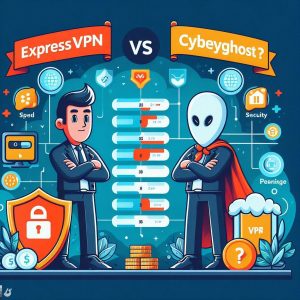
Some key factors that influence the speed differences:
Server Infrastructure – ExpressVPN operates 3,000+ high-performance servers using premium bandwidth across 94 countries. CyberGhost has over 7,400 servers, but ExpressVPN’s infrastructure delivers faster throughput.
Speed Test Feature – ExpressVPN built a speed test tool into its app that connects you to the fastest server based on current conditions. This finds your speediest option.
Encryption Overhead – CyberGhost uses heavier encryption by default which adds more computational overhead resulting in slower speeds. ExpressVPN balances security and speed.
Network Congestion – With more users and data, speeds can suffer during peaks times on more crowded networks. ExpressVPN’s larger server capacity handles congestion better.
For the fastest VPN experience, ExpressVPN takes the lead with speed-optimized servers and network infrastructure. But CyberGhost may still provide acceptable speeds for general browsing and streaming.
Security and Privacy Comparison
Along with speed, rock-solid security and privacy are must-have features for any reputable VPN. In these crucial areas, both ExpressVPN and CyberGhost VPN deliver secure encryption and protocols. But they differ meaningfully in some regards.
Shared Capabilities
- 256-bit AES encryption
- OpenVPN, IKEv2/IPsec protocols
- No activity or connection logs
- DNS and IP leak protection
ExpressVPN Advantages
- Operates own logless DNS on every server
- Uses RAM-only servers that wipe data at reboot
- Proven no-logging policy, audited for verification
CyberGhost Drawbacks
- Logs bandwidth usage by users
- Located in privacy-unfriendly Romania
ExpressVPN goes further than CyberGhost to enhance privacy. Running dedicated secure DNS across its servers prevents DNS leaks and hides querying activity. RAM-only servers leave no trace of user data at reboot.
Most importantly, independent audits have verified ExpressVPN’s strict no-logging policies. CyberGhost admits to more extensive bandwidth logging, which decreases anonymity. And its home country of Romania has loose privacy laws.
For users like journalists, activists, and whistleblowers who require absolute anonymity, ExpressVPN is the safer choice. But CyberGhost still offers adequate privacy for everyday use.
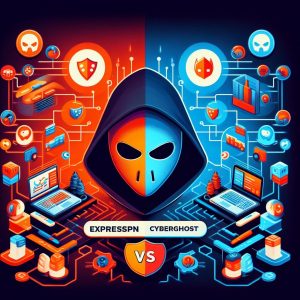
Server Coverage and Locations
The number and location of available VPN servers also make a difference for accessing content and finding fast speeds. This is another area where ExpressVPN shines.
ExpressVPN operates over 3,000 servers spread across 94 countries. Each server location also includes multiple individual servers. CyberGhost has around 7,400 servers across 91 countries.
While the raw server count is lower, ExpressVPN’s network provides more robust coverage where it counts:
Wider Server Distribution – ExpressVPN has servers in more cities and regions within each country. This provides more options to find the fastest speeds.
Unblocked Streaming – Abundant servers worldwide allow bypassing geo-blocks to access streaming sites like Netflix and BBC iPlayer.
Censorship Circumvention – Servers across Asia, the Middle East, and Russia help evade state censorship and surveillance.
Both VPNs offer useful features like obfuscated servers to get around firewalls and connect from restrictive networks. But ExpressVPN’s larger and higher-capacity server network ultimately provides an advantage in server coverage and locations.
Ease of Use and Customer Support
VPNs should be simple to set up and use – nobody wants to struggle with confusing apps or settings.
In this regard, ExpressVPN and CyberGhost are both beginner-friendly services with intuitive apps for Windows, Mac, iOS, Android, and Linux. However, ExpressVPN delivers a noticeably smoother user experience.
Some key usability differences:
Streamlined Apps – ExpressVPN provides one-click server switching and built-in speed testing. CyberGhost requires cumbersome menu choices to change locations and protocols.
Intuitive Interface – ExpressVPN offers a clean, visually appealing interface. CyberGhost uses busier designs with multiple menus and options visible.
Server Browser – ExpressVPN lets you easily filter and select servers by country or city. CyberGhost lacks an integrated browser.
Live Chat Support – ExpressVPN provides 24/7 live chat assistance from knowledgeable representatives. CyberGhost relies primarily on slower email tickets.
Between the two, ExpressVPN offers the more intuitive, user-friendly experience across apps and website. But CyberGhost is still easy enough for VPN newcomers.
Additional Features Comparison
Beyond the basics, ExpressVPN and CyberGhost include some differing extra capabilities:
Split Tunneling – ExpressVPN allows routing only select apps or sites through the VPN tunnel while others go outside to your regular IP address. Useful for accessing region-locked content without slowing everything.
Simultaneous Connections – ExpressVPN permits connecting 5 devices simultaneously. CyberGhost limits this to 1, 3 or 7 devices depending on plan.
Ad and Tracker Blocking – CyberGhost VPN automatically blocks ads and trackers when connected for additional privacy. ExpressVPN lacks built-in ad blocking.
Dedicated IP Addresses – ExpressVPN provides access to dedicated IP addresses to bypass IP-based blocks. Useful for certain sites. CyberGhost does not offer dedicated IPs.
Router Support – Custom router firmware is available from ExpressVPN to secure smart home and IoT devices. CyberGhost has no router app.
Both services provide core VPN capabilities, but ExpressVPN has the edge for power users with split tunneling, dedicated IPs, and router support. However, CyberGhost offers some unique perks like ad blocking.
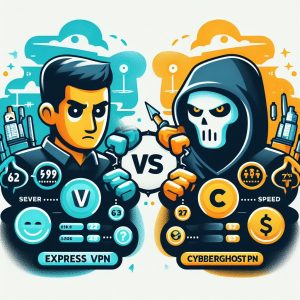
Pricing Comparison
In terms of pricing, CyberGhost VPN is a little lighter on the wallet compared to ExpressVPN. Here’s how the plans break down:
ExpressVPN
- 1 month – $12.95
- 6 months – $9.99/month
- 12 months – $6.67/month
CyberGhost
- 1 month – $12.99
- 1 year – $3.99/month
- 2 years – $2.75/month
- 3 years – $2.25/month
At the long-term subscription lengths, CyberGhost comes out cheaper. Although on short plans, they are similarly priced.
However, ExpressVPN adds much more value through its significantly faster speeds, expansive server network, and usability advantages. For many users, paying slightly more for ExpressVPN is worthwhile.
Both services back their offerings with a money-back guarantee. ExpressVPN allows 30 days for a full refund. CyberGhost only provides a 1-day refund window, which is relatively unforgiving.
Conclusion and Recommendation
Based on this comprehensive comparison, ExpressVPN emerges as the clear winner over CyberGhost VPN in most categories. With advantages in speed, privacy, usability, servers, and support, ExpressVPN is the superior option for the majority of users.
However, CyberGhost remains a decent budget VPN choice if you need basic security and don’t mind slower speeds or minimal servers. The lower pricing may appeal if you aren’t concerned about advanced features and capabilities.
For those seeking the best all-around VPN experience, ExpressVPN stands out with lightning-fast speeds, extensive server coverage, intuitive apps, strong privacy and security, and excellent customer service. While more expensive than some competitors, ExpressVPN adds value that justifies the higher price for the quality you receive.
Introduction
Virtual private networks (VPNs) are essential tools for protecting online privacy and accessing region-restricted content. When choosing a VPN for use in Europe, factors like speed, security features, server distribution, and streaming capabilities need consideration.
This article explores the top five VPNs for European countries based on criteria important to European users. We evaluate server numbers in Europe, speed test results, privacy protections, and unblocking abilities for services like Netflix and BBC iPlayer. Keep reading to determine the right VPN for secure web browsing and content streaming while travelling or living in Europe.

1. NordVPN
NordVPN earns the title as the best overall VPN option across Europe. This Panama-based provider has over 5,400 servers across 60 countries worldwide. In Europe alone NordVPN maintains 2,000+ servers, outnumbering most competitors.
All servers provide impressive speeds for smooth streaming and rapid downloads. Independent tests confirm NordVPN as one of the fastest options in 2022 thanks to proprietary NordLynx protocol rolling out. Plus, NordVPN unblocks popular sites like Netflix, Amazon Prime Video, and BBC iPlayer that often get region-blocked in Europe.
For privacy and security, NordVPN ticks all the boxes as well. It operates under the jurisdiction of Panama to avoid overbearing government surveillance demands. NordVPN also has one of the strictest no-logging policies in the industry regarding customer data and online activity tracking.
Additional protections like CyberSec ad blocking, Double VPN, and Onion Over make NordVPN the most secure VPN accessible across Europe. The convenience of 6-device simultaneous connections per account adds further value for protecting all internet-connected gadgets while travelling abroad.
2. Surfshark
Those needing region flexibility for streaming services should consider Surfshark as the top VPN for accessing European libraries. This British Virgin Islands-based provider has over 3,200 servers in 65 countries to redirect IP addresses and bypass geo-blocks with ease.
What makes Surfshark unique is offering unlimited simultaneous device connections for one subscription cost. So digital nomads and travelling families stay protected across laptops, phones, tablets and more without paying extra fees. Surfshark also reliably unblocks Netflix, allowing binge watching shows from various European countries’ catalogues.
Surfshark is no slouch on speeds either based on independent testing metrics. Some specialized servers even optimize connections for streaming sites like Netflix and BBC iPlayer resulting in 4K video playback without buffering. For privacy, Surfshark operates outside intrusive surveillance alliances to preserve online anonymity.
3. ExpressVPN
Globetrotters wanting server diversity across Europe need to consider ExpressVPN. This VPN heavy-hitter has an astounding 3,000+ servers covering 160 locations worldwide. ExpressVPN maintains servers in 94 countries, exceeding nearly any rival.
Within Europe, ExpressVPN grants access to servers in 27 countries. So users get fine-tuned location targeting no matter where travels take them across the EU. Despite the expansive server network, ExpressVPN delivers fast and stable speeds ideal for HD streaming.
ExpressVPN also packs strong leak protection through Network Lock kill switch technology. The strict no-logging policy adds another layer for achieving digital anonymity in Europe’s heavily-monitored internet landscape. For unlocking geo-blocks, ExpressVPN reliably provides entry to Netflix, BBC iPlayer, Amazon Prime and more video streaming platforms.
The one drawback of ExpressVPN remains its higher subscription costs. But frequent deals help offset the pricing premium of increased access. Plus, the unlimited simultaneous connection allowances provide value for protecting every gadget in your arsenal while abroad.

4. CyberGhost
Savvy shoppers find the best VPN bargain for Europe comes courtesy of CyberGhost. This Romania-based provider manages 7,400+ servers in 90 countries while keeping costs low through efficient infrastructure strategies. Despite the savings, CyberGhost still brings performance – its network generates speeds up to 10-15% faster than costly counterparts.
CyberGhost smartly allocated servers where needed most in Europe, resulting in 380+ locations spread across 50 European countries. High-traffic sites like Germany, France, and the Netherlands have an abundance of servers while also covering less-visited spots like Lithuania and Bulgaria.
Like all top VPNs, CyberGhost incorporates 256-bit AES encryption for securing connections. The strict no-logging policy adds another barrier against customer data collection. For unlocking geo-restrictions, CyberGhost reliably grants access to libraries of Netflix, BBC iPlayer, Disney Plus and other European streaming mainstays.
Bottom line, CyberGhost presents the best balance of affordability and capabilities for European connections. The generous 45-day money-back window also makes test driving this wallet-friendly VPN risk-free.
5. Private Internet Access
Private Internet Access (PIA) stands out as the leading VPN solution for Europe in terms of customer privacy preservation. This provider bases operations out of the United States but still manages to keep no logs despite the unfavorable jurisdiction. PIA even underwent a court-ordered audit confirming it stores no user data that could compromise online identities.
PIA further boosts security through features like an advanced firewall, ad blocker, and split tunneling tools. The 10-simultaneous device allowance per account means all gadgets stay shielded when travelling abroad. PIA also reliably unblocks geo-restrictions, providing access to Netflix, BBC iPlayer libraries.
Speeds fall slightly below fastest-in-class ranges at peak times across PIA’s 3,300+ servers in 77 countries. But performance remains adequate for HD streaming and rapid file downloads. PIA accepts various anonymous payment options like gift cards and cryptocurrency for achieving complete transaction privacy as well.
So privacy purists uneasily browsing in Europe’s heavily-surveilled internet landscape can rest easier using PIA’s uncompromising protections. Just be aware speeds may occasionally throttle during peak congestion.
Conclusion
Determining the best VPN for Europe involves prioritizing capabilities like speed, security protections, privacy policies and streaming accessibility. NordVPN, Surfshark, ExpressVPN, CyberGhost and Private Internet Access each have strengths catering to European VPN needs.
Use this analysis highlighting servers numbers, network speeds, unblocking abilities and enhanced features to select your top VPN matching personal preferences. Any of these five VPNs provide reliable security and unlocking abilities elevating the European browsing experience.




























